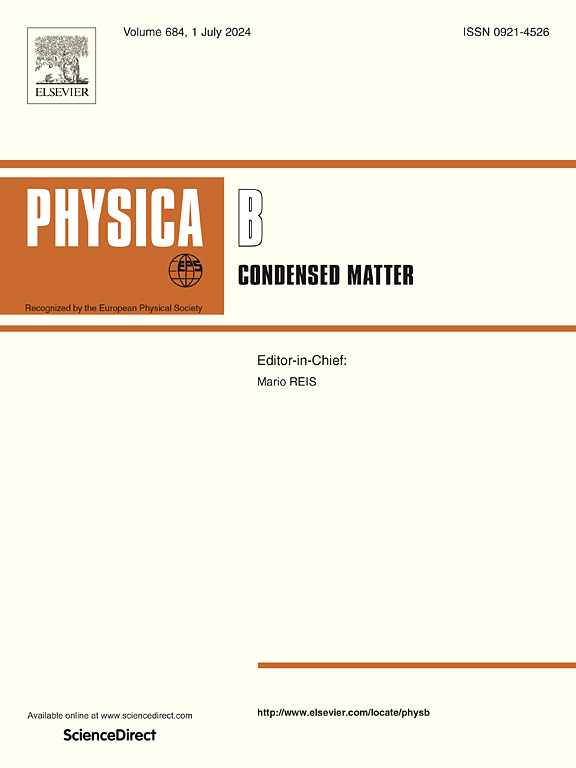温度对硅烯中π−电子自旋极化的影响
IF 2.8
3区 物理与天体物理
Q2 PHYSICS, CONDENSED MATTER
引用次数: 0
摘要
研究了热光子存在下硅烯中π−电子自旋态的行为。光子在温度为T时与环境处于热平衡,就像热源一样。该系统由一个密度算子描述,该算子由相关的时变薛定谔方程得到。我们的计算是基于二阶校正的时变摄动理论。通过对密度算子和自旋分量的乘积进行跟踪,得到了自旋极化作为控制参数的函数。我们的计算表明,自旋极化的振幅与温度和场频率有关。高低温下平均光子数的变化为研究自旋极化的温度行为提供了一个基本的视角。分析了自旋极化的总体时间特性及其对控制参数的依赖关系。本文章由计算机程序翻译,如有差异,请以英文原文为准。
Effect of temperature on the spin polarization of the π−electrons in silicene
The behavior of the electronic spin states in silicene in the presence of the thermal photons is investigated. The photons are in thermal equilibrium with the environment at a temperature , as a heat reservoir. The system is described by a density operator which results from the related time-dependent Schrodinger equation. Our calculations are based on the time-dependent perturbation theory to the second-order of correction. The spin polarization as a function of the controlling parameter is obtained by tracing over the product of the density operator and the spin components. Our calculations show that the amplitude of the spin polarization depends on the temperature and field frequency. The variation in mean photon number at high and low temperature regimes provides a fundamental perspective for studying the temperature behavior of spin polarization. The overall temporal behavior of spin polarization and its dependence on controlling parameters is analyzed.
求助全文
通过发布文献求助,成功后即可免费获取论文全文。
去求助
来源期刊

Physica B-condensed Matter
物理-物理:凝聚态物理
CiteScore
4.90
自引率
7.10%
发文量
703
审稿时长
44 days
期刊介绍:
Physica B: Condensed Matter comprises all condensed matter and material physics that involve theoretical, computational and experimental work.
Papers should contain further developments and a proper discussion on the physics of experimental or theoretical results in one of the following areas:
-Magnetism
-Materials physics
-Nanostructures and nanomaterials
-Optics and optical materials
-Quantum materials
-Semiconductors
-Strongly correlated systems
-Superconductivity
-Surfaces and interfaces
 求助内容:
求助内容: 应助结果提醒方式:
应助结果提醒方式:


